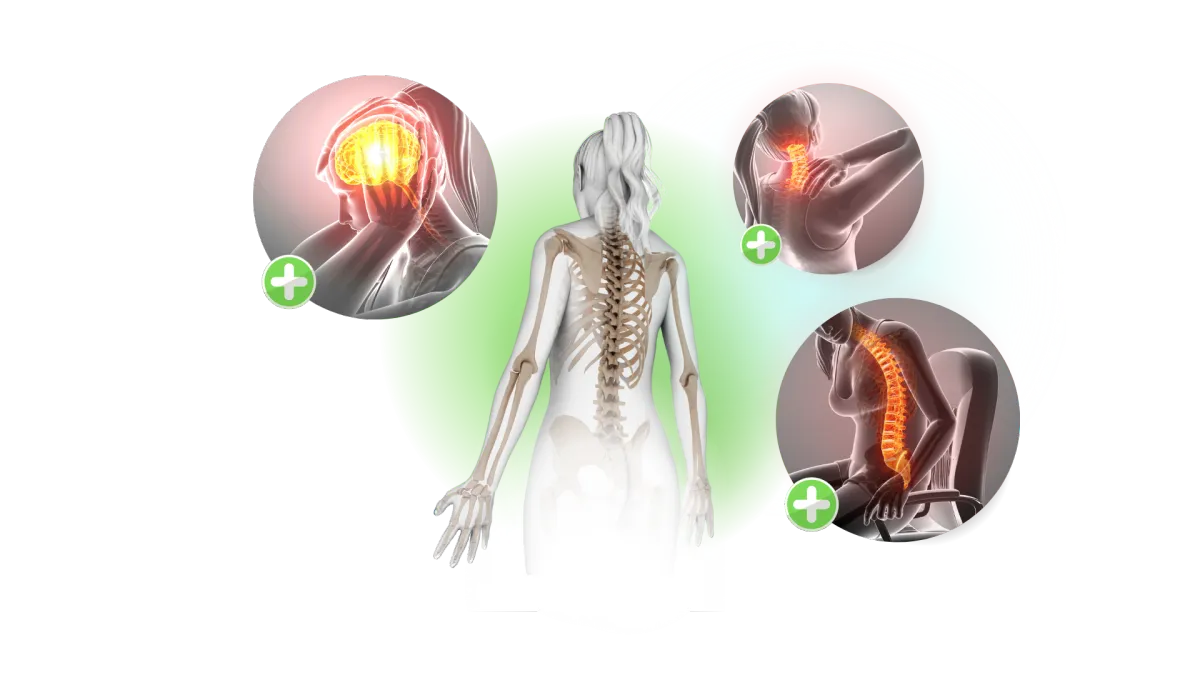12 Weeks To Health
Are you tired of living with chronic long-term back pain, neck pain, or headaches?
Have you tried everything, from pain medication to physical therapy, and still can't find relief?
If you're ready to take control of your spinal health and find relief from pain, click the button to schedule your free assessment now. We look forward to helping you live your best life, pain-free.
Your Spinal Health
Registered chiropractic care in Penrith, Cumbria
5 Poets Walk, Penrith CA11 7HJ · 01768 899 036
Your Trusted Spinal Health Experts
At Your Spinal Health, we are passionate about helping you achieve your best health and well-being. We have been serving our community for over 20 years with a commitment to providing the highest quality care.
Combining natural hands-on treatment with our week-on-week progressive system to help symptoms like back pain, neck pain and headaches.

Start NOW. Just 1-click away
Enjoy family days out without being stopped by pain
Save On Your Treatment Costs
Each visit is £50.
Save if you choose to pre pay.

Start NOW. Just 1-click away
Enjoy family days out without being stopped by pain
MEET THE FOUNDER & CEO
I'm Peter Bennett!
Peter Bennett is a chiropractor in Cumbria with over 25 years of experience helping people overcome back pain, stiffness, and mobility problems — naturally. At Your Spinal Health, his focus is on finding the root cause of spinal problems and restoring lasting balance, strength, and function without cracking or forceful manipulation.
Peter’s gentle, science-based approach supports the body’s own healing process, helping clients not only relieve pain but also improve posture, coordination, and confidence in movement.
Through Your Spinal Health, Peter combines in-clinic care with online self-help programs to empower people to understand their spines, take simple daily actions, and enjoy more years of active, pain-free living.

FAQS
What conditions can we help with?
Spinal health care can help a wide range of conditions, including back and neck pain, headaches, sciatica, joint pain, and even issues related to posture. It's not just about addressing the symptoms; it's about improving your overall health and well-being by improving the health of your spine and nervous system. If you have specific concerns or questions about your condition, please don't hesitate to ask for a consultation to discuss how spinal health care can benefit you.
Is spinal health care safe, and are the adjustments painful?
Spinal health care is generally considered safe when performed by trained professionals. The adjustments are typically not painful; in fact, many clients report feeling relief and improved mobility after an adjustment. Our spinal therapists are highly skilled and will use gentle techniques tailored to your individual needs. Your comfort and safety are our top priorities, and we will explain every step of the process to ensure you feel at ease during your sessions.
How many visits will I need to see results?
The number of sessions you'll need depends on various factors, including the nature and severity of your condition, your overall health, and your treatment goals. Some clients experience relief after just a few sessions, while others may require more ongoing care. During your initial Spinal Health Assessment, our therapists will assess your specific situation and provide a personalised treatment plan. Our goal is to provide efficient and effective care, so you can return to a pain-free and healthy lifestyle as soon as possible.

Your Senses Depend on Your Spine: Here’s Why That Matters
Everyday Life Depends on Your Senses
When you wake up in the morning, the first thing you do is use your senses. You open your eyes to see the daylight, hear the kettle boiling, smell the coffee, taste your breakfast, and feel the warmth of the cup in your hands.
It’s easy to take these senses for granted—until something goes wrong. Blurred vision, ringing in the ears, numb fingers, or poor balance are all signals that something in the body isn’t working as it should. But what many people don’t realise is that the health of your spine plays a huge role in how well your senses work.
The Nervous System Controls Everything
One of the best-known anatomy books puts it simply:
“The nervous system controls and coordinates all the functions of the body and relates the individual to his environment.”–Gray’s Anatomy
That means every sensation you experience—sight, sound, smell, taste, touch, and even your sense of balance—depends on your nerves carrying messages between your body and your brain.
Your spine is the protective case around those nerves. When it’s aligned and moving well, signals travel freely. But when it’s misaligned or restricted, the messages can get distorted, delayed, or blocked.
Did You Know? Your Brain Creates Your Reality
You don’t actually experience reality directly. What you “see, hear, or feel” is your brain’s construction, built out of the electrical signals travelling through your nerves.
If those nerves are irritated, pinched, or misfiring, your brain is working with faulty information. That means your experience of reality itself can be altered—through blurred vision, ringing in the ears, dizziness, or tingling sensations.
How Spinal Misalignment Can Affect Your Senses
Think of your nerves like electrical wires carrying information. If the wiring is pinched or frayed, the signal isn’t clear.
A misaligned neck can irritate the nerves linked to your eyes, ears, and balance centres.
Pressure in the middle back can change how nerves control touch and strength in your arms and hands.
Lower back problems can affect the nerves to your legs, feet, and sense of balance.
The result? Strange sensations like tingling, numbness, or altered perception of the world around you.
What This Blog Series Will Cover
Over the next few weeks, I’ll be diving into each sense in turn and showing how your spine can affect it:
Sight– blurred vision, headaches, eye strain.
Hearing and Balance– tinnitus, dizziness, vertigo.
Smell and Taste– how your brain processes flavour and scent.
Touch– tingling, numbness, pins and needles.
Body Awareness (Proprioception)– your “hidden sense” of movement and balance.
My goal is to explain in simple terms how the spine and nervous system work together, so you can understand your symptoms better—and know what you can do to protect your health.
Takeaway: Protect Your Spine, Protect Your Senses
Your senses are not separate from your spine. They rely on clear, open communication through the nervous system. And as Gray’s Anatomy reminds us, the nervous system is in charge of everything.
When you look after your spine, you’re not just protecting your back—you’re protecting the way you see, hear, feel, taste, and experience the world.

